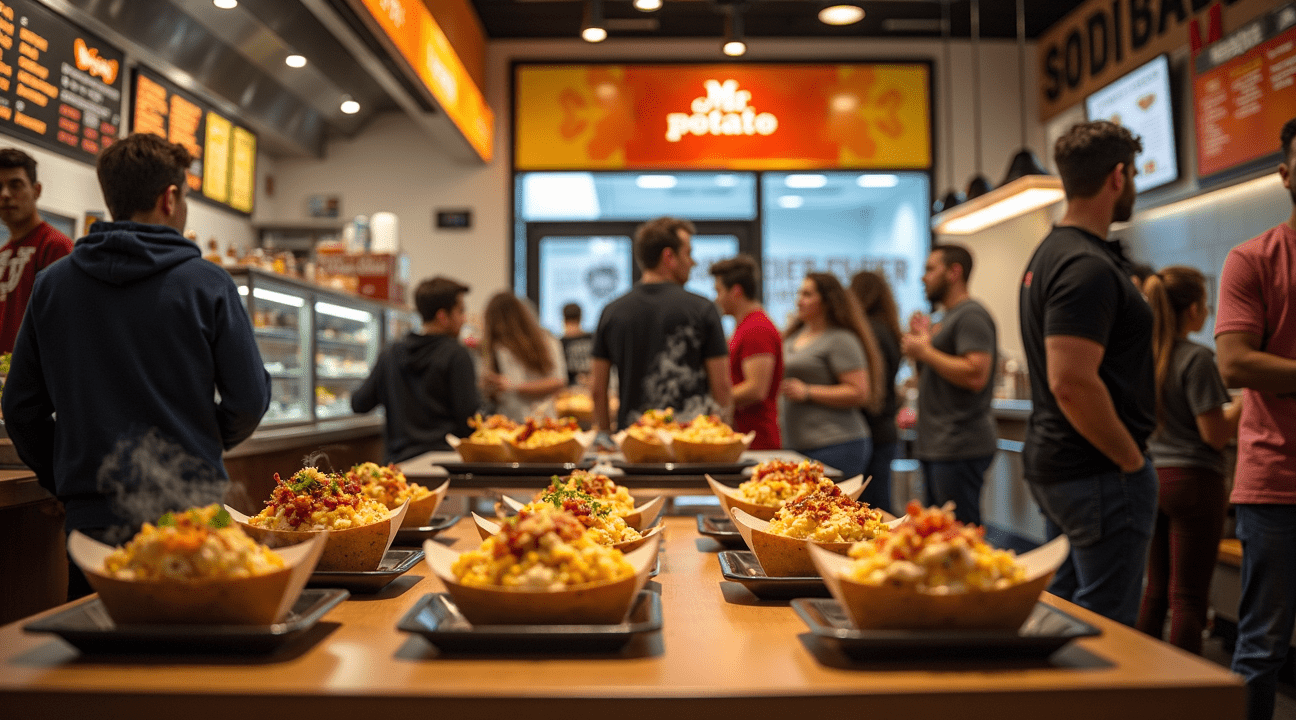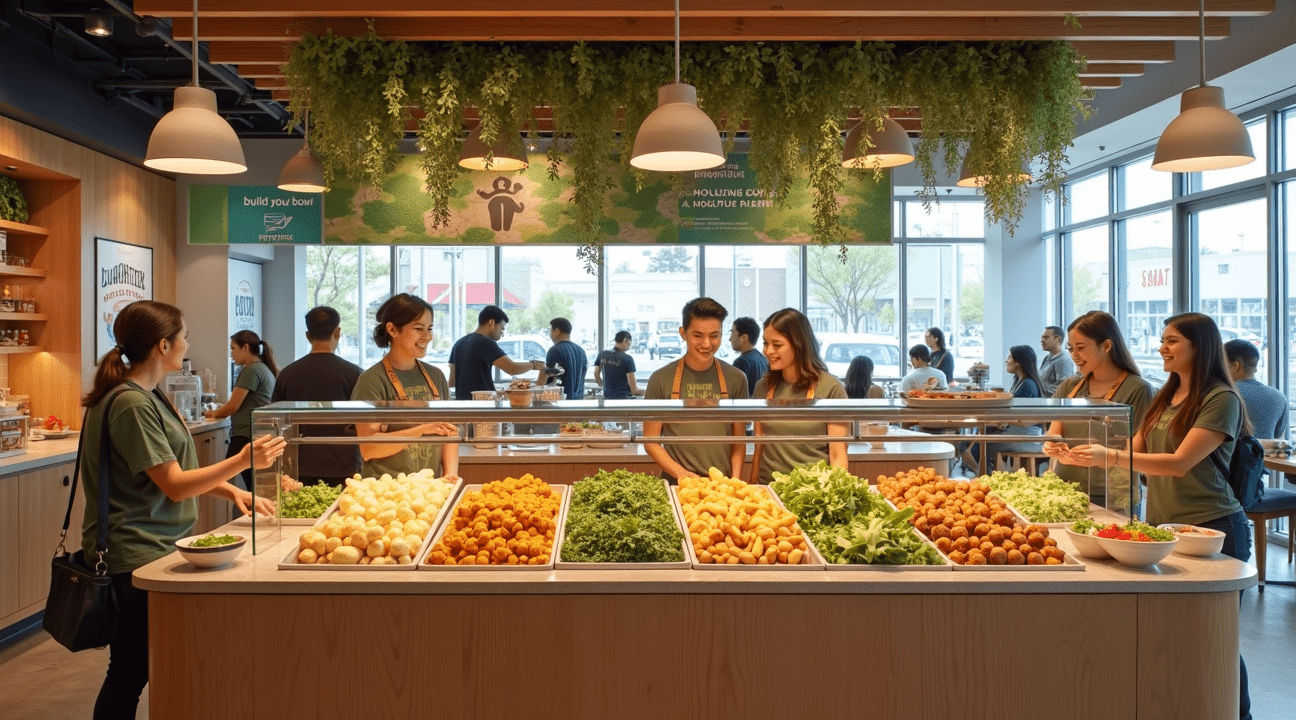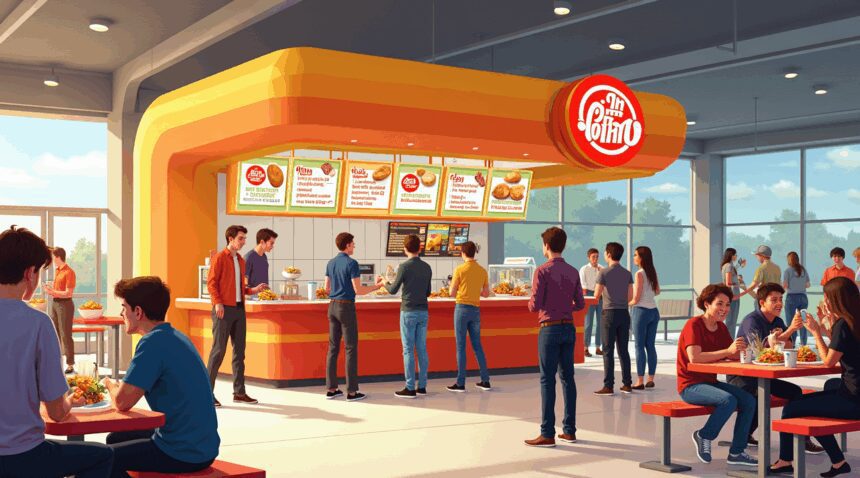Mr Potato successfully disrupted Australia’s fast food landscape by positioning loaded baked potatoes as the centerpiece of a health-conscious dining concept, proving that innovative menu strategies could carve out profitable niches in the competitive quick-service restaurant market.
The brand’s strategic expansion into the American market through a Minnesota food court location, combined with competitive pricing ranging from $4.98 to $11.98 for one-pound servings, demonstrates calculated international growth while testing consumer acceptance in new territories.
Key Takeaways
- Unique Market Positioning: Mr Potato differentiated itself from traditional burger and pizza chains by specializing exclusively in customizable loaded baked potatoes, creating a novel fast-casual category that appeals to health-conscious consumers.
- Strategic Pricing Structure: The brand’s $4.98–$11.98 pricing range competes directly with traditional fast food at the entry level while offering premium value through generous one-pound portions and extensive customization options.
- Community-Focused Expansion Strategy: The planned 2025 national food truck tour represents a grassroots marketing approach that builds authentic community connections while testing new markets without the overhead costs of permanent locations.
- Health-Conscious Brand Identity: Founders Jess Davis and Tyson Hoffmann successfully positioned the brand as a healthier alternative to conventional fast food, capitalizing on growing consumer demand for customizable, nutritious quick-service options.
- International Growth Momentum: The rapid expansion from Australia to the American market, starting with a Minnesota food court location, indicates strong operational capabilities and confidence in the concept’s scalability across diverse geographic regions.
For more insights into the company’s strategy and expansion plans, you can explore their official site via Mr Potato.
Mr Potato Takes America: Australian Potato Chain Lands at Minnesota Food Court
I watched with interest as Mr Potato made its American debut at St. Cloud’s Crossroads Center Food Court in late 2024. The Australian chain brought something fresh to the Minnesota dining scene with its unique approach to fast-casual dining.
Menu and Pricing Strategy
Mr Potato launched with an impressive selection of 13 different stuffed potato varieties. Each offering weighs in at a full pound, providing substantial value for hungry customers. The pricing structure ranges from $4.98 for basic options up to $11.98 for premium loaded varieties.
This pricing strategy positions Mr Potato competitively within the fast-casual segment. The lower-end options compete directly with traditional fast food meals, while the premium selections offer restaurant-quality portions at reasonable prices. The one-pound serving size differentiates the brand from typical quick-service portions.
Operating Schedule and Market Position
The chain operates Monday through Saturday from 10 am to 8 pm, with reduced Sunday hours of 11 am to 6 pm. These extended daily hours accommodate both lunch and dinner crowds, maximizing revenue potential in the food court environment.
Mr Potato’s entrance into the American market fills a notable gap. Stuffed potato concepts remain uncommon in U.S. fast food, creating a unique market position for the Australian brand. While legacy burger and sandwich chains dominate the quick-service landscape, Mr Potato offers something different entirely.
The concept’s novelty works in its favor. American consumers accustomed to burgers, pizza, and sandwiches can explore a new category without venturing far from familiar comfort food territory. Potatoes already hold broad appeal across demographics, making the transition easier for curious customers.
Food court placement provides strategic advantages for testing American market reception. The lower overhead costs and built-in foot traffic allow Mr Potato to gauge consumer response before committing to standalone locations. This approach mirrors successful international expansion strategies used by other food brands.
The stuffed potato format also aligns well with current food trends emphasizing customization and perceived health benefits. Unlike Guy Fieri’s traditional American fare, Mr Potato taps into the comfort food segment while offering what appears to be a more wholesome base ingredient.
Mr Potato’s American launch represents a calculated risk in an established market. The brand leverages its Australian success while adapting to local preferences and expectations. Early reception will determine whether the concept can expand beyond Minnesota into broader U.S. markets.

Jess Davis and Tyson Hoffmann Transform Fast Food with Loaded Potatoes
Founded by Jess Davis and Tyson Hoffmann, Mr Potato carved out a unique niche in Australia’s competitive fast-food landscape by specializing exclusively in loaded baked potatoes. I’ve watched this brand challenge conventional fast-food wisdom by proving that potatoes could be the star of a modern restaurant concept rather than a simple side dish.
Building a Cult Following Through Strategic Positioning
Davis and Hoffmann positioned Mr Potato as a healthier alternative to traditional fast food, capitalizing on growing consumer demand for better-for-you options. Their loaded potatoes offered customizable meals that could satisfy various dietary preferences while maintaining the convenience and speed that fast-food customers expect. This strategic positioning allowed them to differentiate their brand from burger chains and pizza outlets that dominated the quick-service restaurant space.
The duo’s approach to branding proved equally important to their success. They crafted a fun, adventurous, modern lifestyle image that resonated with younger demographics seeking Instagram-worthy food experiences. Celebrity chef endorsements and social media buzz helped amplify their message beyond traditional advertising channels.
Energetic Leadership Drives Consumer Engagement
Davis and Hoffmann’s energetic personalities became central to Mr Potato’s brand identity and marketing strategy. Their hands-on approach to social media and customer interaction created authentic connections that many corporate fast-food chains struggle to achieve. I noticed how their personal involvement in promoting the brand helped establish trust and loyalty among customers who appreciated knowing the faces behind their favorite loaded potato creations.
The founders leveraged their enthusiasm to build what many consider a cult following in Australia. Their ability to maintain consistent quality while expanding locations demonstrated that passion-driven leadership could successfully scale a niche concept. Customer testimonials and repeat business rates reflected the strong emotional connection that Davis and Hoffmann fostered through their authentic approach to hospitality and food service.
Mr Potato’s success under their leadership proved that innovative concepts could thrive in the fast-food industry when backed by clear vision, strategic positioning, and genuine customer engagement. Their achievement transformed perceptions about what constitutes viable fast-food offerings while establishing potatoes as legitimate meal centerpieces rather than mere accompaniments.
https://www.youtube.com/watch?v=o12_i7dOaEvC0M
One-Pound Potatoes with Endless Customization Options
I found Mr Potato’s menu strategy centered around massive one-pound stuffed baked potatoes that served as blank canvases for culinary creativity. The restaurant’s core offerings transformed simple potatoes into substantial meals through an impressive array of toppings including butter, steamed broccoli, crispy bacon, seasoned chicken, ranch dressing, and numerous other options.
The menu expanded beyond these signature potatoes to include hearty soups, fresh bread bowls, refreshing soft drinks, and colorful slushies. This diverse selection created multiple touchpoints for customers seeking different dining experiences within a single visit.
Strategic Focus on Customization and Health
Mr Potato’s approach emphasized flexibility and personalization in ways that set it apart from traditional fast food competitors. The customization model allowed diners to create meals that aligned with their specific dietary needs and preferences. Health-conscious customers could load their potatoes with steamed vegetables and lean proteins, while those seeking indulgent comfort food could pile on bacon, cheese, and rich sauces.
The restaurant’s commitment to accommodating various dietary preferences proved particularly effective in attracting vegetarian consumers. Plant-based diners could enjoy substantial, filling meals by combining the massive potato base with:
- Fresh steamed vegetables like broccoli and other seasonal options
- Multiple cheese varieties for protein and flavor
- Various sauces and seasonings to enhance taste profiles
- Butter and other dairy-based toppings for richness
This inclusive approach helped Mr Potato capture market segments that often felt overlooked by conventional fast food chains. The generous portion sizes ensured customers received substantial value for their money, with one-pound potatoes providing enough food to satisfy even hearty appetites.
The menu design philosophy recognized that modern diners wanted control over their dining experience. Rather than offering predetermined combinations, Mr Potato empowered customers to build their ideal meal from the ground up. This strategy created a sense of ownership and satisfaction that extended beyond simple hunger fulfillment.
The combination of large serving sizes and endless customization options positioned Mr Potato uniquely in the competitive fast food landscape. While other chains focused on speed and standardization, this potato-centric concept prioritized personalization and substance. The approach resonated particularly well with customers who viewed dining as more than mere sustenance and appreciated the ability to craft meals that reflected their individual tastes and nutritional goals.
The restaurant’s success with health-conscious consumers stemmed from its ability to deliver both indulgence and nutrition within the same framework. A single potato could serve as either a decadent treat loaded with rich toppings or a wholesome meal featuring fresh vegetables and lean proteins. This versatility attracted diverse customer bases and encouraged repeat visits as diners explored different combinations.
Healthier Fast Food Alternative Captures Growing Wellness Market
Mr Potato carved out a unique position in the competitive fast food landscape by focusing on what traditional chains often overlook: genuine nutrition without sacrificing convenience. Instead of following the burger-and-fries formula that dominates the industry, Mr Potato built its brand around the humble potato as a versatile, wholesome base for customizable meals.
The timing couldn’t have been better for this approach. Consumer preferences have shifted dramatically over recent years, with health-conscious diners actively seeking alternatives to heavily processed fast food options. Mr Potato recognized this trend early and positioned itself as the solution for people who want quick service without compromising their wellness goals.
Rapid Expansion Across Australia
The brand’s growth trajectory in Australia demonstrates the power of aligning with consumer values. Mr Potato’s expansion strategy focused on high-traffic locations where health-conscious consumers gather — shopping centers, business districts, and university campuses. Each new outlet reinforces the brand’s commitment to providing fresh, customizable potato-based meals that compete directly with both traditional fast food and emerging healthy alternatives.
What sets Mr Potato apart from competitors isn’t just the potato-centric menu — it’s the level of customization available to customers. Diners can choose from various potato preparations, then select from an extensive array of fresh toppings, proteins, and sauces. This approach transforms a simple potato into a satisfying, nutritionally balanced meal that appeals to diverse dietary preferences and restrictions.
The competitive landscape in Australia includes established healthy fast-casual brands and traditional quick-service restaurants attempting to add healthier options to their menus. Mr Potato’s advantage lies in its singular focus on the potato as a nutritious foundation, rather than treating healthy options as an afterthought or menu addition.
Unlike chains that struggle to maintain consistency while offering healthier choices, Mr Potato built its entire operational model around fresh preparation and nutritional transparency. The brand doesn’t hide behind marketing buzzwords — customers can see their meals being prepared with fresh ingredients, creating trust and reinforcing the health-conscious positioning.
The customization element proves particularly powerful in today’s market, where consumers expect personalization across all aspects of their dining experience. Mr Potato’s approach allows individuals to create meals that fit their specific nutritional needs, whether they’re following particular diets, managing food allergies, or simply wanting to control portion sizes and ingredients.
Market research consistently shows that Australian consumers are willing to pay premium prices for healthier fast food options, especially when those options don’t require them to sacrifice taste or convenience. Mr Potato’s business model capitalizes on this willingness by offering perceived value through nutrition and customization rather than competing solely on price.
The brand’s success also reflects broader societal shifts around food consciousness and environmental awareness. Potatoes require fewer resources to produce than many protein sources, and the vegetable-forward menu appeals to consumers interested in reducing their environmental footprint without adopting fully vegetarian or vegan lifestyles.
Competition from traditional fast food giants attempting to capture health-conscious consumers has intensified, but Mr Potato maintains advantages through its specialized focus and authentic commitment to nutrition. While larger chains add salads or healthier sides to existing menus, Mr Potato’s entire identity revolves around providing satisfying, nutritious meals quickly and affordably.
The expansion strategy continues to focus on locations where the target demographic — health-conscious consumers seeking convenient meal options — naturally congregates. This targeted approach allows Mr Potato to build brand loyalty within specific communities rather than attempting to appeal to all fast food consumers simultaneously.
Each new outlet serves as both a revenue generator and a marketing touchpoint, demonstrating the brand’s commitment to health and customization. The consistent experience across locations reinforces consumer confidence and encourages repeat visits, essential factors in building sustainable growth in the competitive quick-service restaurant sector.

National Food Truck Tour Brings Community Focus to Brand Strategy
Mr Potato’s 2025 national food truck tour represents a strategic pivot that showcases the brand’s commitment to grassroots engagement across Australia. I observe this initiative as a brilliant move that positions the company closer to its target demographic while building authentic community connections. The tour demonstrates how modern fast food brands can break away from traditional storefront models to create more personal customer experiences.
Grassroots Marketing Strategy Creates Authentic Brand Connections
The food truck approach allows Mr Potato to test new markets without the substantial overhead costs associated with permanent locations. I see this strategy as particularly effective for reaching communities that may not have access to traditional fast food outlets. The mobile format enables the brand to participate in:
- Local festivals
- Farmers markets
- Community events
This creates organic touchpoints that feel less commercial and more community-oriented.
This grassroots approach also generates valuable data about local preferences and market demand. Each stop provides insights into regional tastes and customer behavior patterns that can inform future expansion decisions. The tour acts as a living market research laboratory, allowing the brand to adapt its offerings based on real-time feedback from diverse communities.
Community Engagement Reinforces Brand Values
The tour’s emphasis on local community support aligns perfectly with Mr Potato’s healthy food positioning. I notice how this strategy differentiates the brand from larger fast food competitors who often struggle with authentic community connections. By bringing their offerings directly to neighborhoods, schools, and local events, Mr Potato demonstrates a genuine investment in community welfare.
This community-focused narrative strengthens brand loyalty and creates word-of-mouth marketing opportunities that traditional advertising can’t replicate. Local media coverage of tour stops generates earned media value while reinforcing the brand’s commitment to accessibility and health-conscious dining options.
The rapid expansion suggested by this nationwide tour indicates strong brand momentum and financial backing. I interpret this bold move as evidence that Mr Potato has found its market fit and is confident in scaling its operations. The tour serves dual purposes:
- Expanding brand awareness
- Maintaining the personal touch that initially attracted customers
The food truck tour strategy positions Mr Potato as an innovative disruptor in the fast food space, combining mobility with community engagement to create a unique market position. This approach could become a template for other emerging food brands looking to build authentic connections while testing market viability across diverse geographic regions.

Key Performance Metrics and Market Position
Mr Potato has established a competitive pricing strategy that positions the brand well within the fast food market landscape. Current U.S. menu prices range from $4.98 to $11.98 per loaded potato, creating an accessible price point that appeals to value-conscious consumers while maintaining premium positioning compared to traditional fast food offerings.
Pricing Strategy and Market Positioning
The pricing structure reflects a strategic approach to market penetration. At the lower end, the $4.98 entry point competes directly with quick-service meal options, while the $11.98 premium offerings target consumers seeking more substantial, customizable meals. This pricing range allows the brand to capture multiple customer segments simultaneously, from budget-minded students to professionals looking for elevated fast-casual dining experiences.
The price points demonstrate careful market analysis, as they fall within the sweet spot for fast-casual dining. Customers receive perceived value through generous portion sizes and extensive customization options, justifying the premium over traditional fast food while remaining accessible to mainstream consumers.
Growth Trajectory and Expansion Indicators
Market momentum indicators suggest rapid expansion, particularly in international markets. The founders’ planned 2025 tour represents a significant milestone, indicating the brand has achieved sufficient scale and success to warrant such marketing investment. This tour strategy typically signals a company’s confidence in its product-market fit and operational capabilities.
Several factors point to strong performance metrics across key areas:
- Revenue growth appears substantial based on expansion velocity and marketing investment capacity
- Brand recognition has reached levels sufficient to support nationwide promotional tours
- Operational efficiency has likely improved to enable rapid scaling without quality degradation
- Customer retention metrics must be performing well to sustain expansion funding
- Franchise or licensing appeal has grown strong enough to attract quality partners
The Australian market entry timing aligns with global fast-casual trends favoring customizable, Instagram-worthy food options. While specific sales figures remain undisclosed, the speed of market penetration suggests strong unit economics and consumer acceptance. The decision to invest in a nationwide tour indicates the brand has moved beyond the initial launch phase into sustained growth territory.
Geographic expansion patterns typically correlate with performance metrics, and the rapid movement into international markets suggests domestic success has provided both the capital and operational expertise needed for global scaling. The timing of the Australian launch, followed quickly by tour announcements, indicates a systematic approach to market development that prioritizes brand building alongside revenue generation.
Customer acquisition costs appear manageable given the expansion pace, while the premium pricing strategy suggests healthy profit margins per transaction. The loaded potato concept’s inherent shareability on social media likely contributes to organic marketing effectiveness, reducing customer acquisition expenses compared to traditional advertising-dependent models.
Market position strength becomes evident through the brand’s ability to command premium pricing while maintaining growth velocity. The $11.98 top-tier pricing demonstrates customers view Mr Potato as offering sufficient value to justify costs comparable to sit-down restaurant appetizers or casual dining sides.
The 2025 tour announcement timing suggests the brand has achieved critical mass in terms of location density and brand awareness. Companies typically invest in such marketing initiatives only after establishing sustainable unit economics and proving scalability across diverse markets. This indicates Mr Potato has successfully transitioned from startup to growth-stage company with measurable market traction.
Performance indicators also suggest strong operational execution, as rapid expansion without public quality or service issues indicates effective systems and training protocols. The ability to maintain brand consistency while scaling suggests sophisticated operational infrastructure development.
Sources:
Sydney Times – “Founders of Mr Potato Jess Davis and Tyson Hoffmann announce inaugural national food truck tour to share healthy food and support local communities”
WJON – “‘Mr. Potato’ Joins St. Cloud’s Crossroads Center Food Court”


